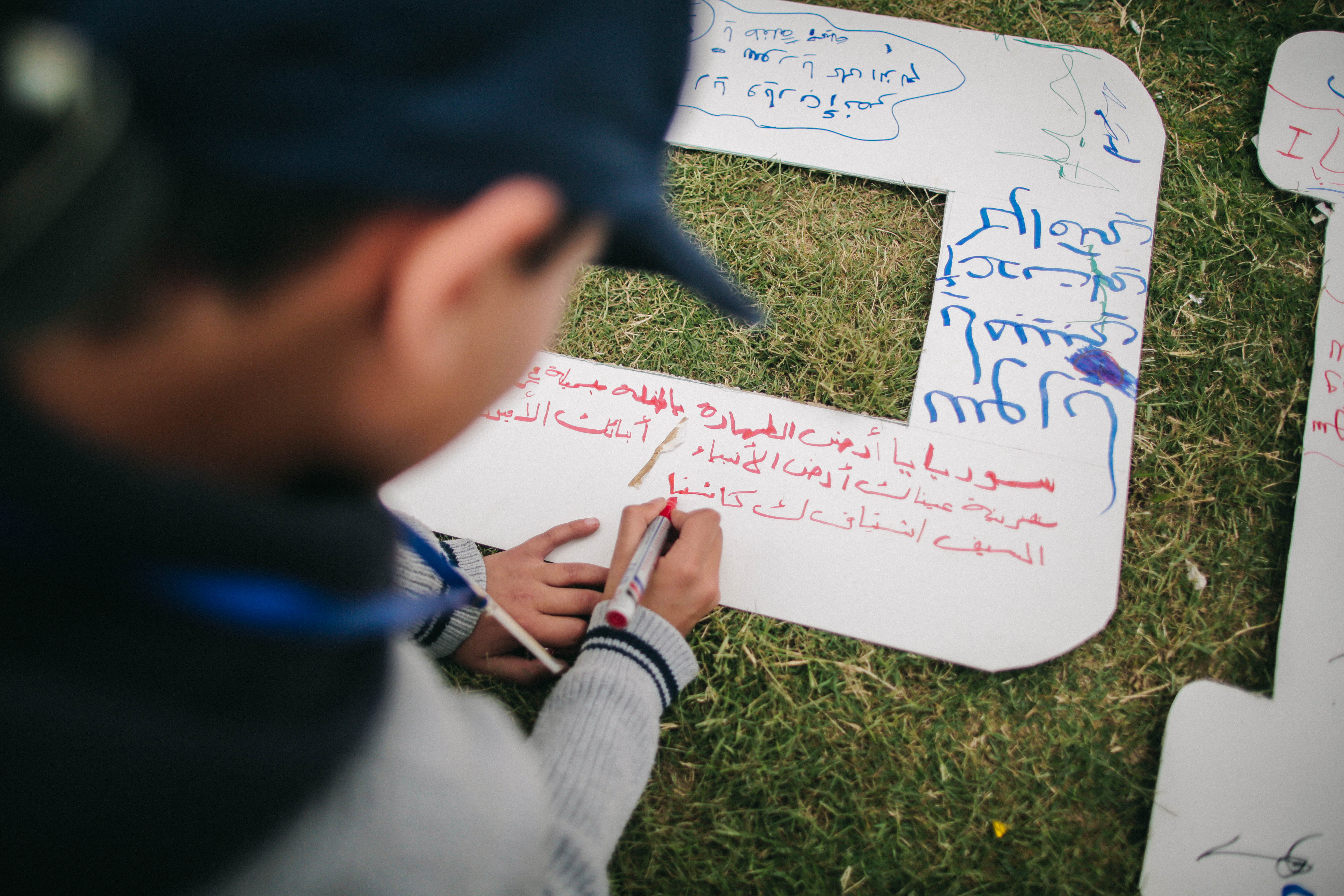Harsh living conditions forced Ahmed and his family to flee Syria and seek asylum in Egypt to settle near the coastal city of Alexandria.

A 12-year-old Syrian boy writing a poem about Syria when asked to express his feelings about for his home country. UNHCR/ Ahmad Mohsen.
Tucking his checkered football under his arm, eight-year-old Ali* races his brothers to the nearby public park. Panting behind is their grandfather, who instead bends his stiffening knees and rests his body on the concrete pavement, seeking shelter in the shade of a palm tree.
In 2012, Ahmad’s* eldest son was killed in Syria, leaving behind two young toddlers and a pregnant wife. Immediately, he stepped in to fill the void hollowed out by the absence of his son, caring for his grandchildren and his daughter-in-law.
But as the situation grew more dangerous in their hometown in rural Damascus, his fear for the safety of his family, including his own wife, traumatized son, daughter and son-in-law, soared to new heights. “We were repeatedly displaced in Syria. We slept on cardboard in schools and on the floors of kindergartens. The covers were very thin and kids were always sick and coughing,” he recalls.
These harsh living conditions forced Ahmad and his family to flee Syria and seek-asylum in Egypt, settling near the coastal city of Alexandria.
“A refugee is a person who lost their whole life and had to start over from scratch,” he says, reflecting on his life as an elderly refugee who doubles as a father to his grandchildren.
Although Ahmad had exercised his role as a father for years, raising his three grandchildren as his own in exile at the age of 61 is proving extremely challenging. He has had to find a school for them, take them for wellness check-ups and vaccination and offer them the closest he could to a safe and happy childhood.
Thus, being able to register them at an Egyptian public school lifted some weight off his rounded shoulders.
In 2012, Egypt granted Syrian refugees access to education on equal footing with Egyptian nationals; an opportunity also awarded to Sudanese, South Sudanese and Yemeni refugees. According to the Egyptian government, the number of Syrian students registered in the public education system exceeds 32,000. However, accommodating refugee and asylum-seekers in schools has added pressure on an already strained public education system, where schools suffer from overcapacity and a shortage of faculty and facilities.
In addition, Syrian refugees benefit from government-subsidized transportation and food items, as well as access to the public health system at the same cost borne by Egyptians. Such sharing of public services and government subsidies represents an added challenge for the Egyptian economy, which is undergoing major reforms.
While Egypt continues to generously host refugees and asylum-seekers like Ahmad, who was able to send his younger son and eldest grandson to receive professional psychosocial support at an Egyptian public hospital in Agamy, to help them overcome the trauma of war and separation, international support is crucial to maintain these levels of support.
Thus, this year the Government of Egypt appealed for approximately USD 151 million from the international community to support state institutions responding to the protection, education and health needs of refugees and providing broad and quality services for both the refugee and host community. In previous years, Egypt had received significantly less than one percent of the total grants disbursed by the international community following the Brussels I & II conferences, an annual conference on “Supporting the Future of Syria and the Region.”
At the moment, there are over 247,000 refugees and asylum-seekers registered with UNHCR in Egypt, with the government estimating the number of unregistered refugees to be much higher. Ongoing conflicts and instability in Yemen, Sudan, South Sudan, the Horn of Africa and sub-Saharan Africa have led to a 24 percent increase in the number of registered refugees and asylum seekers in Egypt in the past two years.
Despite Egypt’s hospitality and support to refugees, many struggle to feed their families, send their children to school and keep themselves sheltered. Last week, UNHCR warned that this surge in the refugee and asylum-seeker population, coupled with funding shortfalls for its operation in Egypt is leaving many refugees without critical support and protection. Many are also rapidly sinking into debt and poverty, forcing them to resort to desperate measures to survive, such as child labour and early marriages.
In light of this, UNHCR calls upon members of the international community to increase their support to the government of Egypt to match the efforts undertaken to sustain its refugee population and the wider host community.
*Names changed for protection reasons.
Share on Facebook Share on Twitter